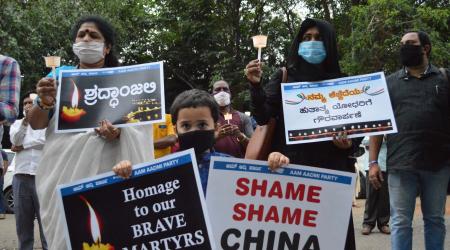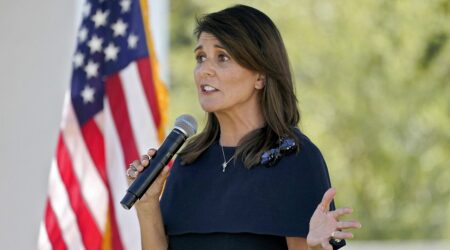By Shivaji Sengupta
During the Cuban Missile Crisis, when the U.S. created a naval blockade around the island, Robert Kennedy sent a handwritten note to his brother, President John F. Kennedy. It said, “When large nations make war, they should do so like porcupines make love: cautiously.”
President Biden and President Xi Jinping should remember the late Senator’s good-natured warning now that Nancy Pelosi’s politically provocative visit to Taiwan has precipitated what is quite possibly a crisis, second only to the Russia-Ukraine war.
Mistakes have been made all around. The Speaker of the House Pelosi should have heeded the president’s warning. The military had advised him not to provoke China at this time. The president was not assertive enough, caught between prudence and provocation. China, particularly President Xi, has responded a bit too aggressively with sorties of fighter aircraft and shooting rockets dangerously close to Taiwan.
China has now severed contacts with the U.S. on vitally important counts, including military matters and critical climate cooperation.
Both superpowers need restraint.
But tell that to Xi. Seeking an unprecedented third term as Chairman of the Chinese Communist Party and the president of China, Xi feels he has to appear Mr. Strongman, a la, Putin, and achieve Mao-like glory in the annals of China. Thanks to him, there is a sizable population in his country awash with nationalism. He has fanned the flames; the flame surrounds him.
US President Biden, on the other hand, has seemed indecisive. The Democratic Party itself seems like a rabbit paralyzed by the glaring headlights of the midterm elections in less than three months.
And the Speaker, suddenly conscious that the Constitution gives Congress its own authority vis-a-vis governance has transcended the House’s traditional emphasis on domestic affairs and encroached into foreign policy. Otherwise, why would she march into Taiwan despite President Biden’s cautionary stand?
Thus, both the U.S. and China are motivated by the public’s perception of strength. Both countries, like most of the world, are going through tough economic times. Xi wants to continue as China’s head of state. He feels the need to make a show of strength. Nancy Pelosi is trying to do what she can to make the U. S. look tough in preparation for the mid-terms. President Biden is projecting himself, to America and the rest of the world, as responsible.
But let us not imagine Taiwan here to be a helpless pawn in international power politics. The Progressive Democrats, governing the country now, have historically alienated China by asserting its right to autonomy. Taiwanese do not deny they are a part of China. If we are to go by their most recent elections, the majority of its 24 million do not want to be a part of communist China. China, however, has been content to wait, insisting at the same time that Taiwan has to join the mainland, sooner rather than later. 2050 is the deadline for them. Recently, President Xi has been using the phrase “by force if necessary,” while emphasizing China’s stand.
Force is precisely what makes Taiwan’s Democratic Progressive Party bristle. Nancy Pelosi’s visit is now making China bristle. They have openly threatened through military drills very close to Taiwan’s borders. While the tiny island country in the south of China is keeping up a brave front, it is easy to imagine what its population might be going through. The country is on a war footing, defensively speaking.
Had this been happening before Russia attacked Ukraine in February this year, I would have dismissed China’s gestures as posturing. That’s what I had done about Russia last January. It would be wrong to make the same mistake again. So I am not going to predict.
Instead, let us discuss the complex relationship of support that the U.S. and Taiwan have been living through these last 25 years.
Very recently President Biden, when asked in a press conference in Western Europe if the U.S. will defend Taiwan by going into war with China, answered with a “Yes.” He briefly cited the agreement between the two countries to justify his response. But it isn’t as simple as that.
There have been several agreements between Taiwan and us. While each pledge that the U.S. will help, all of them do not say that the United States will actually put boots on the ground. There was even talk of this country tapering off arms sales to Taiwan although the most recent communique between us assures that the U.S. is not setting a date to stop arms sales, or even funding their military. There is little doubt that going into a war on behalf of Taiwan will be nothing short of disastrous for us, economically and in terms of the war itself. China is fast overtaking the U.S. economically, and even in its arsenal, the U.S. does not enjoy a clear-cut advantage. China has more warships and naval submarines than we do.
That does not, however, mean that China has nothing to lose!
Reality is far from it. A prolonged war against Taiwan will severely cripple its economy, and in an all-out war, the U.S. is still considered to have an advantage.
Most significantly, a war between the United States and China is certain to decimate both countries, particularly economically. China may end up annexing Taiwan, but it will no longer be leading the world financially. Neither will it be considered a premier military power. Can China afford that?
That brings me back to the prediction I promised not to make. I won’t say whether China will risk a war against the U.S. on account of Taiwan. By all counts, the U.S. will not attack China. What needs to be seen is just how much China wants Taiwan to be China’s. How much are they willing to risk?
Nancy Pelosi’s decision to visit Taiwan at this juncture, being the first very senior government official to do so in 25 years, was a risky move. It may have convinced some saber-rattling Americans that she believes in America is powerful, but I’m not sure that in the long run, we will vote bullets over money. It’s the economy, stupid!
To Taiwan, I will urge them to balance their love for democracy with prudence: do not be so hawkish as to provoke China into taking any more belligerent action than they already have. Nancy should have whispered this advice to the Taiwanese president if she already hasn’t.
And Joe Biden? Now that the Speaker’s visit has happened, he should maintain her stand and make the maximum hay out of it, congratulate the head of Congress on a job well done, and look to the mid-term elections hopefully.
Gas prices are back under four dollars at least in New York. Unemployment is at 3.5 percent. Inflation will come down even though not to what the Democrats would like. And Donald Trump is threatening to shoot himself on the foot – again!
We don’t need China!

(Shivaji Sengupta retired as VP of Academic Affairs from Boricua College, NYC. He holds a Ph.D. in English and Comparative Literature from Columbia University.)
==
Disclaimer: The views expressed are not necessarily those of The South Asian Times











